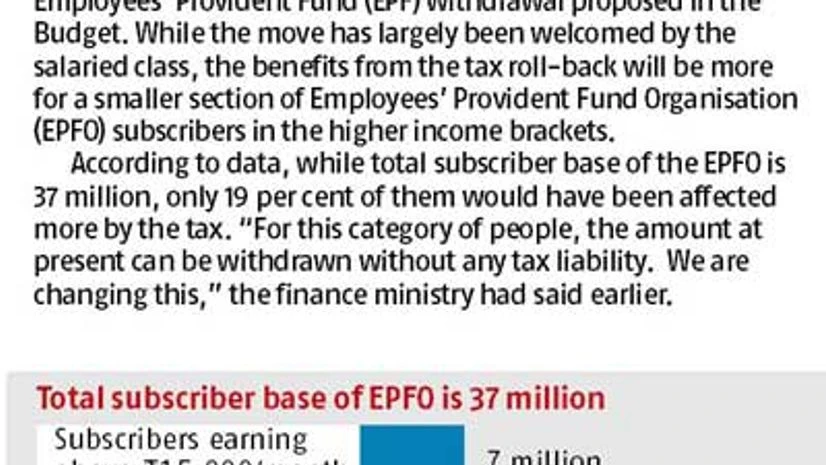The backlash over the proposal to tax Employees’ Provident Fund (EPF), which forced the government to withdraw it on Tuesday, has put the spotlight on how this proposal made its way into the Budget — in the first place.
Like all major proposals in the Budget, this, too, was discussed among top policymakers in the finance ministry and the Prime Minister’s Office (PMO). Now, officials say none of the people involved in the Budget-making process anticipated how unpopular the proposal would become.
Read more from our special coverage on "EPF"
While rolling back the proposal on Tuesday, Finance Minister Arun Jaitley also took back his earlier proposal to tax contribution made by an employer beyond Rs 1.5 lakh a year to EPF. Both the proposals had drawn strong condemnation from trade unions, the Opposition and the salaried class.
However, Jaitley retained a proposal not to tax 40 per cent of money withdrawn from the National Pension System (NPS). This means, only 60 per cent of one’s NPS corpus would be taxed at the time of withdrawal, against the current practice of taxing the whole among.

“We failed to communicate the intent of the proposal. The feedback from the first day itself was largely adverse and the perception was gaining ground how it was anti-middle class. It had also given the Opposition a stick to beat us,” said the source.
The Bharatiya Janata Party (BJP) did not want to upset the salaried middle class, which it considers its core support base. The feedback was also received from chief ministers of BJP-ruled states such as Anandiben Patel of Gujarat.
Another government official said the two paragraphs in the Budget speech on the EPF tax are now being seen as ambiguous.
“With so much work going on leading up to the Budget, it escaped everyone that maybe we needed to re-look those two sections. Now we have the benefit of hindsight.”
The two paragraphs read: “In case of superannuation funds and recognised provident funds, including EPF, the same norm of 40 per cent of corpus to be tax free will apply in respect of corpus created out of contributions made after 1.4.2016.”
“Further, the annuity fund which goes to the legal heir after the death of pensioner will not be taxable in all three cases. Also, we are proposing a monetary limit for contribution of employer in recognised Provident and Superannuation Fund of Rs 1.5 lakh per annum for taking tax benefit.”
The Bharatiya Mazdoor Sangh (BMS), the trade union arm of the Rashtriya Swayamsevak Sangh, welcomed the rollback. A senior BMS official said it was senior bureaucrats who ‘misled’ the PM on the issue.
“We in the BMS had discussed the issue of “lack of accountability” of bureaucrats during our recent national executive meeting in Hyderabad (on February 6 and 7). We had also called for a need to reform bureaucracy,” BMS Organising Secretary Pawan Kumar told Business Standard.
Increasingly, several senior members of the Sangh Parivar have been attributing the failure of the government to implement its key schemes on the bureaucracy. Sources pointed to the PM’s references to “lack of accountability” of the bureaucracy during his speech on the motion of thanks to the address by the President in the Lok Sabha on March 3. The speech had come within days of the EPF tax announcement.
The PM had, then, said how mutual recriminations between the Opposition and the government, whether now or earlier, have reduced the accountability of the bureaucracy. The PM said the bureaucracy ‘enjoyed’ these accusations and counter-accusations. “It is important that we together increase the accountability of our executive,” Modi had said.
The PM had said hundreds of thousands of crores of rupees were spent in paying the salaries of the bureaucracy and there was no dearth of programmes or policies, both during the tenure of his government or earlier, but implementation remained a problem. “Governments will come and go and they will get the brickbats, but their (bureaucracy’s) fun at our expense will not stop.”

)
